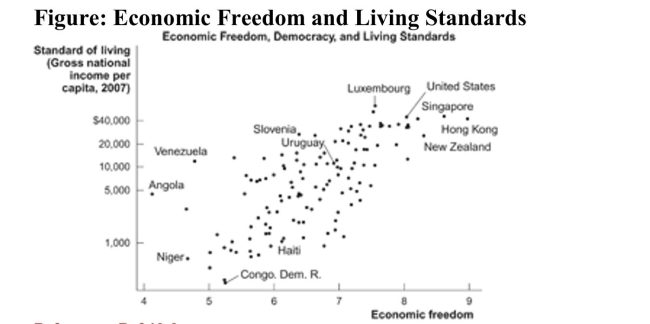Exam 19: Public Goods and the Tragedy of the Commons
Exam 1: The Big Ideas in Economics103 Questions
Exam 2: The Power of Trade and Comparative Advantage169 Questions
Exam 3: Business Fluctuations: Aggregate Demand and Supply114 Questions
Exam 4: Equilibrium: How Supply and Demand Determine Prices105 Questions
Exam 5: Elasticity and Its Applications153 Questions
Exam 6: Taxes and Subsidies100 Questions
Exam 7: The Price System: Signals, Speculation, and Prediction149 Questions
Exam 8: Price Ceilings and Floors199 Questions
Exam 9: International Trade78 Questions
Exam 10: Externalities: When the Price Is Not Right146 Questions
Exam 11: Costs and Profit Maximization Under Competition126 Questions
Exam 12: Competition and the Invisible Hand29 Questions
Exam 13: Monopoly144 Questions
Exam 14: Price Discrimination and Pricing Strategy152 Questions
Exam 15: Oligopoly and Game Theory127 Questions
Exam 16: Competing for Monopoly: the Economics of Network Goods51 Questions
Exam 17: Monopolistic Competition and Advertising143 Questions
Exam 18: Labor Markets148 Questions
Exam 19: Public Goods and the Tragedy of the Commons153 Questions
Exam 20: Political Economy and Public Choice151 Questions
Exam 21: Economics, Ethics, and Public Policy143 Questions
Exam 22: Managing Incentives140 Questions
Exam 23: Stock Markets and Personal Finance53 Questions
Exam 24: Asymmetric Information: Moral Hazard and Adverse Selection133 Questions
Exam 25: Consumer Choice141 Questions
Exam 26: Gdp and the Measurement of Progress135 Questions
Exam 27: The Wealth of Nations and Economic Growth155 Questions
Exam 28: Growth, Capital Accumulation, and the Economics of Ideas: Catching up Vs the Cutting Edge145 Questions
Exam 29: Saving, Investment, and the Financial System146 Questions
Exam 30: Supply and Demand183 Questions
Exam 31: Unemployment and Labor Force Participation96 Questions
Exam 32: Inflation and the Quantity Theory of Money165 Questions
Exam 33: Transmission and Amplification Mechanisms133 Questions
Exam 34: The Federal Reserve System and Open Market Operations144 Questions
Exam 35: Monetary Policy139 Questions
Exam 36: The Federal Budget: Taxes and Spending158 Questions
Select questions type
What are some reasons why markets are not free and unregulated?
Free
(Multiple Choice)
4.9/5  (33)
(33)
Correct Answer:
D
Which of the following statements is FALSE?
Free
(Multiple Choice)
4.8/5  (34)
(34)
Correct Answer:
B
________ groups tend to favor more efficient policies.
Free
(Multiple Choice)
4.8/5  (38)
(38)
Correct Answer:
B
If consumers are hurt by quotas and tariffs such as the sugar quota, why do they remain rationally ignorant about these policies?
(Essay)
4.9/5  (36)
(36)
The incumbent party will most likely get reelected when economic conditions are worsening in an economy.
(True/False)
4.8/5  (34)
(34)
One reason for the good record of democracies on economic growth is that:
(Multiple Choice)
5.0/5  (39)
(39)
The basic concept behind the median voter theorem is that: I. the median voter is defined as the voter for which half of the other voters want a policy to the left and half of the voters want a policy to the right. II. when voters vote, regardless of whether they vote closest to their preferences or not, the preference of the median voter is sure to win in a majority win election. III. if voters vote closest to their preferences, then the preference of the median voter is sure to win in a majority win election.
(Multiple Choice)
4.9/5  (41)
(41)
Let's check on whether you are rationally ignorant. Which of the following four items is the smallest in terms of government expenditure?
(Multiple Choice)
4.7/5  (36)
(36)
Evidence suggests that voters are myopic, meaning they are responsive to economic conditions:
(Multiple Choice)
4.8/5  (43)
(43)
Explain why candidates with extreme views do not tend to get elected. What economic theorem is this most closely tied to?
(Essay)
4.8/5  (44)
(44)
 Reference: Ref 19-3 (Figure: Economic Freedom and Living Standards) Refer to the figure. Based on the data in this chart, the country with the lowest level of economic freedom is:
Reference: Ref 19-3 (Figure: Economic Freedom and Living Standards) Refer to the figure. Based on the data in this chart, the country with the lowest level of economic freedom is:
(Multiple Choice)
4.8/5  (42)
(42)
The most important assumption of the median voter theorem is that:
(Multiple Choice)
4.9/5  (37)
(37)
When benefits are concentrated and costs are diffused, resources often get wasted on projects with high benefits and low costs.
(True/False)
4.9/5  (40)
(40)
Politicians can often use the concept of rational ignorance on the part of voters to their advantage.
(True/False)
4.7/5  (36)
(36)
Which of the following theories works to explain which voters will get their way in a democratic election?
(Multiple Choice)
4.9/5  (34)
(34)
The median voter is the person/voter who is exactly in the middle of the population, when one is counting the population in numbers.
(True/False)
4.8/5  (32)
(32)
Data for the United States show that the incumbent party tends to win the election if: I. personal disposable income is growing. II. the inflation rate is low. III. the political party has not been in power for too many continuous terms.
(Multiple Choice)
4.7/5  (33)
(33)
Showing 1 - 20 of 153
Filters
- Essay(0)
- Multiple Choice(0)
- Short Answer(0)
- True False(0)
- Matching(0)